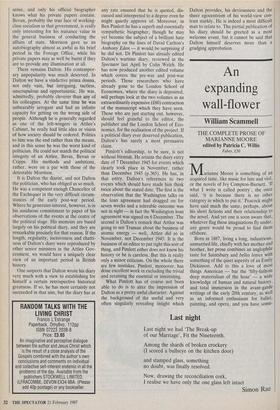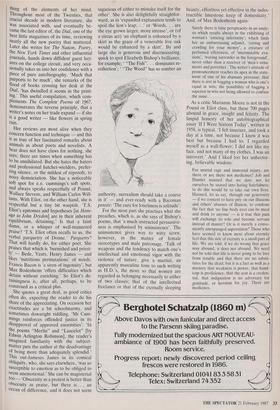An expanding wall-flower
William Scammell
THE COMPLETE PROSE OF MARIANNE MOORE edited by Patricia C. Willis
Faber, £30
Marianne Moore is something of an acquired taste, like music for lute and viol, or the novels of Ivy Compton-Burnett. 'If what I write is called poetry', she once said, 'it is because there is no other category in which to put it.' Peacock might have said much the same, perhaps, about his short fictions and their relationship to the novel. And yet one is soon aware that, whatever flag these imaginations fly under, any genre would be proud to find them offshore.
Born in 1887, living a long, industrious, unmarried life, chiefly with her mother and brother, her prose combines an anglophile taste for Saintsbury and belles lettres with something of the quiet asperity of an Emily Dickinson. Add to this a love of most things American — bar the 'fifty-fathom deep materialism of the hour' — a wide knowledge of human and natural history, and total immersion in the avant-garde writings of the early 20th century, as well as an informed enthusiasm for ballet, painting, and opera, and you have some- thing of the elements of her mind. Throughout most of the Twenties, that crucial decade in modern literature, she was associated with, and eventually be- came the last editor of, the Dial, one of the best little magazines of its time, reviewing nearly all the new poetry that mattered. Later she writes for The Nation, Poetry, the New York Times and other influential journals, hands down diffident guest lect- ures on the college circuit, and very occa- sionally takes us into her confidence with a piece of pure autobiography. 'Much that purports to be much', she remarks of the flood of books crossing her desk at the Dial, 'has dwindled it seems in the print- ing.' This useful compilation, which corn- Plements The Complete Poems of 1?67, demonstrates the reverse principle, that a writer's notes on her trade expand — if she is a good writer — like flowers in spring rain.
Her reviews are most alive when they concern function and technique — and this is as true of her fascinated remarks about animals as about poets and novelists. A bear does not have claws for nothing, she says; there are times when something has to be annihilated. But she hates the haters and professional hatchet-wielders, prefer- ring silence, or the mildest of reproofs, to noisy denunciation. She has a noticeable soft spot for e.e. cummings's soft spots, and always speaks respectfully of Pound, Wallace Stevens, and William Carlos Will- iams. With Eliot, on the other hand, she is respectful but a tiny bit waspish. 'T.S. Eliot's epitomes and hypotheses [in Hom- age to John Dryden] are in their inherent equilibrium, detaining.' Is that a faint damn, or a whisper of well-mannered praise? 'T.S. Eliot often recalls to us, the verbal parquetry of Donne.' Parquetry? That will hardly do, for either poet. She praises that which is 'burnished and priest- ly' — Bede, Yeats, Henry James — and likes 'nutritious permutations' of words. Francis Bacon is 'a siren of ingenuity', but Max Bodenheim 'offers difficulties which detain without enriching.' So Eliot's de- tainingness is, after all, perhaps, to be construed as a critical plus.
She quotes a great deal, as good critics often do, expecting the reader to do his share of the appreciating. On occasion her exactitudes are a bit schoolmarmy, and sometimes downright riddling. `Mr Cum- mings reinforces offended justice in its disapproval of approved enormities': 'In the poems "Merlin" and "Lancelot" [by Edwin Arlington Robinson], the reader's imagined familiarity with the subject- matter puts the author at the disadvantage of being more than adequately splendid.' This out-Jameses James in its comical obliquity, who, she says elsewhere, 'was so susceptible to emotion as to be obliged to seem unemotional.' She can be magisterial too ____ 'Obscenity as a protest is better than obscenity as praise, but there is. . . an ocean of difference, and it does not seem sagacious of either to mistake itself for the other'. She is also delightfully straightfor- ward, as in 'expanded explanation tends to spoil the lion's leap. . .' or 'Words. . . are the eye grown larger, more intense', or (of a circus act) 'an elephant is enhanced by a skirt as the grace of a venerable live oak would be enhanced by a skirt'. By and large she is generous and discriminating, quick to spot Elizabeth Bishop's brilliance, for example; ' "The Fish". . . dominates re- collection'; "The Weed" has so somber an authority, surrealism should take a course in it' — and ever-ready with a Baconian pensee: 'The cure for loneliness is solitude'.
For the most part she practises what she preaches, which is, as she says of Bishop's poems, that 'a much instructed persuasive- ness is emphasised by uninsistence'. The uninsistence gives way to witty scorn, however, in the matter of female stereotypes and male patronage. 'Talk of weapons and the tendency to match one's intellectual and emotional vigor with the violence of nature, give a martial, an apparently masculine tone to such writing as H.D.'s, the more so that women are regarded as belonging necessarily to either of two classes; that of the intellectual freelance or that of the eternally sleeping beauty, effortless yet effective in the indes- tructible limestone keep of domesticity.' And, of Max Bodenheim again: Surely there is false perspicacity in an analy- sis which results always in the exhibiting of woman's 'enticing inferiority'; which finds her an embarrassing adjunct, 'cooing and crawling for your money', a creature of perfumed effeteness, of 'interminable eva- sions', 'waving surrender in the foreground', never other than a receiver of `men's orna- ments and poverties'. The writer's attitude of pronouncement reaches its apex in the state- ment of one of his dramatis personae, that there is zest in bagging a woman who is one's equal in wits; the possibility of bagging a superior in wits not being allowed to confuse the issue.
As a critic Marianne Moore is not in the Pound or Eliot class, but these 700 pages abound in grace, insight and felicity. The limpid honesty of her autobiographical essay 'If I Were Sixteen Today', written in 1958, is typical. 'I felt insecure, and took a day at a time, not because I knew it was best but because I had to. I regarded myself as a wall-flower; I did not like my face, and not many of my clothes. I was an introvert.' And I liked too her unhector- ing, believable wisdom:
For mortal rage and immortal injury, are there or are there not medicines? Job and Hamlet insisted that we dare not let ourselves be snared into hating hatefulness; to do this would be to take our own lives. Harmed, let us say, through our generosity — if we consent to have pity on our illusions and others' absence of illusion, to condone the fact that 'no fine body ever can be meat and drink to anyone' — is it true that pain will exchange its role and become servant instead of master? Or is it merely a conve- niently unexpunged superstition? Those who have seemed to know most about eternity feel that this side of eternity is a small part of life. We are told, if we do wrong that grace may abound, it does not abound. We need not be told that life is never going to be free from trouble and that there are no substi- tutes for the dead; but it is a fact as well as a mystery that weakness is power, that hand- icap is proficiency, that the scar is a creden- tial, that indignation is no adversary for gratitude, or heroism for joy. There are medicines.



















































 Previous page
Previous page